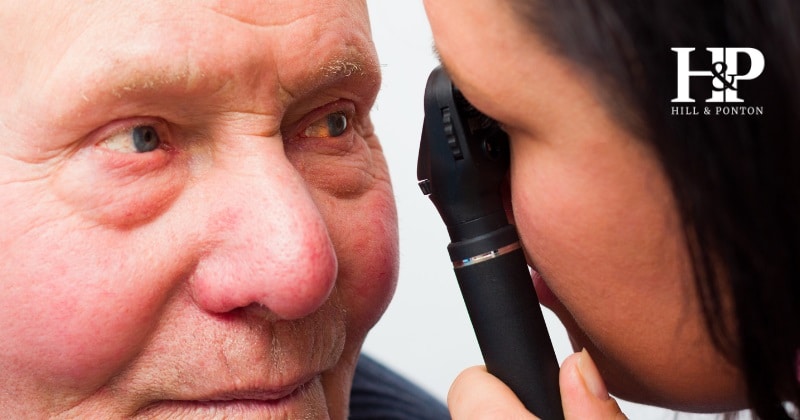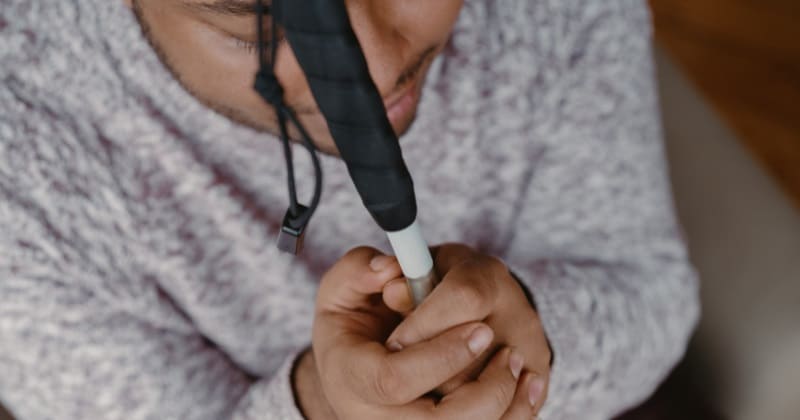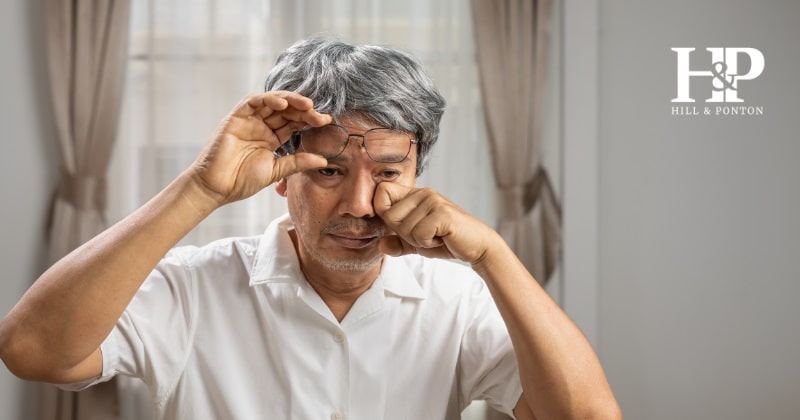Cataracts represent one of the most widespread vision disorders among military veterans, affecting hundreds of thousands each year. 804,730 military health patients were diagnosed with cataracts in 2021 alone, and the risk of cataracts among veterans is closely linked to the unique hazards of military service. About 62% of traumatic eye injuries occur during combat operations, while another 28% result from noncombat duties and training activities.
Whether your cataracts developed from direct physical trauma sustained during active duty, exposure to harmful environmental factors, or secondary to service-connected diseases such as diabetes mellitus, you may be able to obtain VA benefits for this condition.
Eligibility and Service Connection
To qualify for a VA disability rating for cataracts, a veteran needs:
- A current diagnosis of cataracts.
- A service connection, meaning the cataracts were caused or worsened by military service.
- Medical evidence linking the condition to service, such as military medical records or a VA Compensation & Pension (C&P) exam.
To file a successful claim, veterans should provide:
- Service treatment records indicating eye injuries or vision issues.
- Medical records showing a cataract diagnosis.
- Eye examination reports confirming the severity of the condition.
- A nexus letter from a doctor connecting cataracts to service-related factors.
How to Establish Service Connection for Cataracts
Veterans must demonstrate how their cataracts are connected to service. This can be done in two ways:
- Direct Service Connection – If cataracts developed due to an eye injury, chemical exposure, or prolonged sun exposure during service, a direct link must be established.
- Secondary Service Connection – If cataracts are caused by a service-connected condition (such as diabetes mellitus), they may qualify for compensation.
Does Agent Orange Cause Cataracts?
The VA does not officially recognize Agent Orange as a direct cause of cataracts. However, diabetes mellitus, a presumptive condition for Agent Orange exposure, is linked to cataracts. Veterans exposed to Agent Orange who later develop diabetes-related cataracts may still qualify for benefits under secondary service connection.
Diabetes Mellitus (Type II) and Cataracts
Diabetes mellitus (type II) is a chronic condition that significantly increases the likelihood of developing secondary complications, including cataracts. For veterans who already have service-connected diabetes, the presence of cataracts may qualify for a secondary disability rating—but proving the connection is key.
Extensive research, including findings from the American Diabetes Association (ADA), has confirmed that individuals with diabetes are at a 60% higher risk of developing cataracts compared to those without the condition. Moreover, diabetes accelerates cataract progression, leading to earlier onset and more severe impairment. Given this well-documented relationship, diabetes-related cataracts should qualify for secondary service connection—but be aware that the VA’s policy on this issue has changed over time.
At one point, VA’s Adjudication Manual (M21-1) directly acknowledged cataracts as a complication of diabetes. Up until December 2005, the VA instructed claims examiners to presume that a veteran’s cataracts were caused by diabetes mellitus unless there was clear evidence of another cause. This meant that veterans with service-connected diabetes could automatically qualify for additional disability compensation for cataracts unless proven otherwise.
However, in the 2005 revision of the M21-1 manual, the VA removed this automatic presumption, instead stating that cataracts “may” be a complication of diabetes. This revision shifted the burden of proof onto veterans, requiring them to provide medical evidence that their cataracts are “at least as likely as not” caused or aggravated by their service-connected diabetes.
While this change makes it more difficult for veterans to receive automatic approval, knowing the VA’s prior stance can still be helpful when filing a secondary service connection claim. Veterans should ensure their claim includes:
- A medical diagnosis of cataracts
- Evidence linking diabetes to the cataracts, such as a doctor’s nexus letter
- Service-connected status for diabetes mellitus type II
By demonstrating that their cataracts are a direct consequence of diabetes, veterans may secure secondary service connection and receive additional disability compensation.
What Is the VA Disability Rating for Cataracts?
Cataracts are evaluated under 38 CFR § 4.79, Schedule of Ratings – Eye, Diagnostic Code 6027. The rating depends on visual impairment, incapacitating episodes, and whether surgery has been performed. The VA assigns cataract ratings of 10%, 20%, 40% or 60% based on how frequently a veteran requires medical treatment for their condition in a given year:
- 60% – Requires 7 or more treatment visits for an eye condition in the past 12 months.
- 40% – Requires at least 5 but no more than 7 treatment visits in the past 12 months.
- 20% – Requires at least 3 but less than 5 treatment visits in the past 12 months.
- 10% – Requires at least 1 but less than 3 treatment visits in the past 12 months.
VA Ratings Before and After Cataract Surgery
If cataracts impair visual acuity (clarity of vision) or cause frequent incapacitating episodes, a veteran may receive a rating based on the severity of vision loss. After a veteran undergoes cataract surgery, the VA still uses the General Rating Formula for Diseases of the Eye but modifies the rating based on the surgical outcome.
- With a Replacement Lens (Pseudophakia) – Veterans who receive an intraocular lens implant will typically be rated based on residual vision impairment.
- Without a Replacement Lens (Aphakia) – If no artificial lens is implanted, the VA assigns a minimum 30% disability rating, which can increase based on the level of vision loss.
Veterans with progressive vision loss due to cataracts may request a rating increase if their condition worsens.
Maximizing VA Benefits
Beyond disability compensation, veterans with cataracts may qualify for VA-provided vision care, including:
- Free eye exams and prescription glasses
- Surgical treatment for cataracts
- Low-vision rehabilitation services
Does the VA Cover Cataract Surgery?
The VA does cover cataract surgery for eligible veterans. This includes lens replacement surgery and post-operative care.
How to Increase VA Ratings and Benefits
If a veteran’s cataracts worsen, they can:
- File for an increased rating based on reduced vision or complications.
- Combine multiple conditions (such as cataracts and diabetic retinopathy) for a higher combined disability rating.
- Appeal a low rating if the initial evaluation does not reflect the severity of vision impairment.
Has the VA Denied Your Claim?
If the VA denies service connection for cataracts or assigns a lower rating than expected, don’t lose hope—you have options to challenge the decision and fight for the benefits you deserve.
- Request a Higher-Level Review – If you believe the VA made a mistake in evaluating your claim, you can request a Higher-Level Review (HLR), where a more senior VA adjudicator will reevaluate your case without new evidence.
- Submit a Supplemental Claim – If your denial was due to lack of medical evidence, you can file a Supplemental Claim with new supporting documents, such as an updated diagnosis, doctor’s opinion (nexus letter), or additional medical records.
- Appeal to the Board of Veterans’ Appeals (BVA) – If previous attempts fail, you can escalate your case to the Board of Veterans’ Appeals, where a Veterans Law Judge will review the decision.
The VA appeals process can be complicated and frustrating, but working with an experienced VA disability attorney can increase your chances of success. If you feel your claim was unfairly denied or underrated, don’t wait—get a free case evaluation today and take the next step toward securing the benefits you’ve earned.




